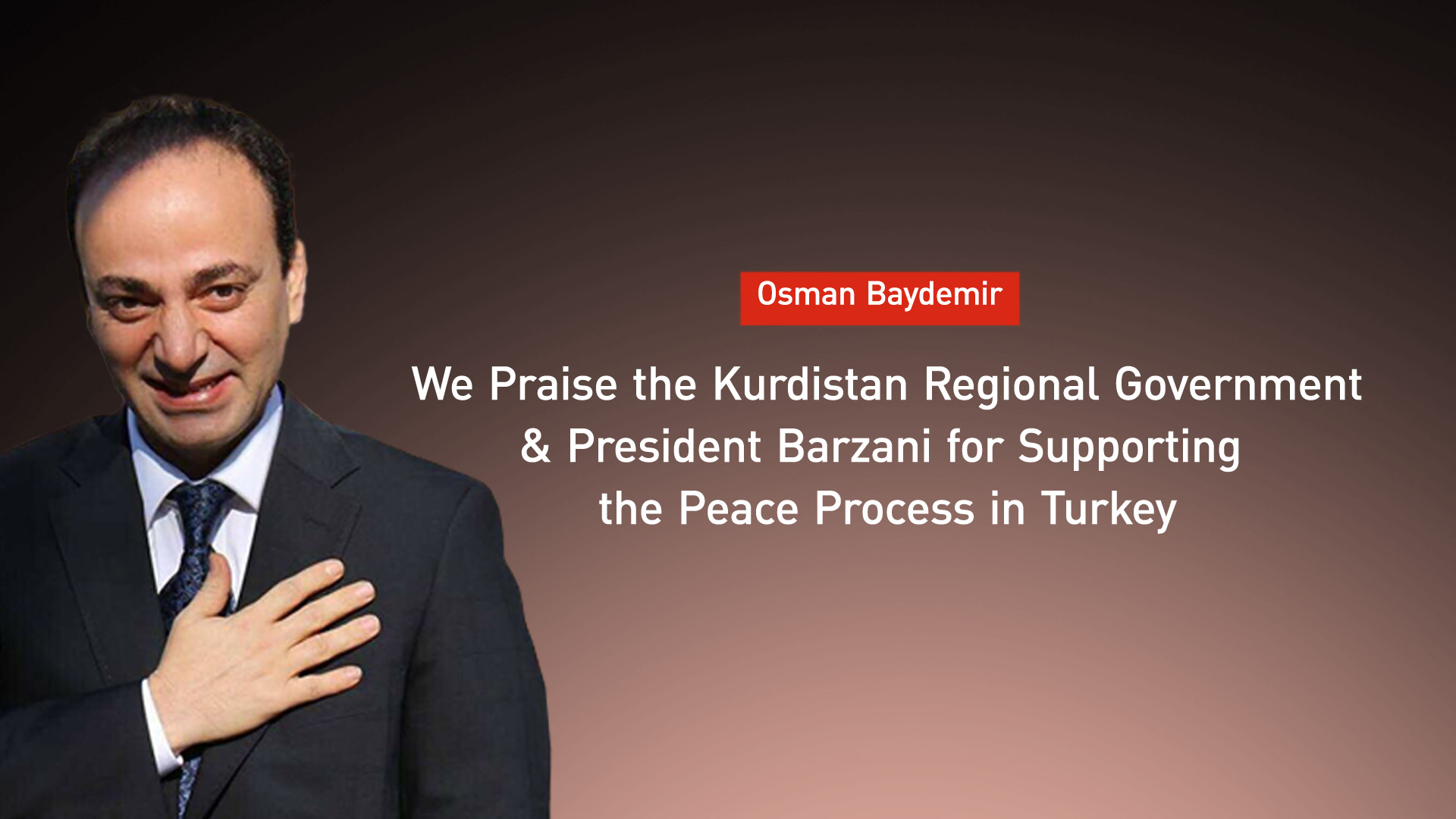Baydemir Urges Ankara to Take Bold Steps: “Peace Cannot Be Achieved Unilaterally”
Former-Kurdish MP urged Turkey to act post-PKK disarmament, thanking President Barzani for his support. 'Ankara's silence isn't good,' he told Kurdistan24, noting jailed Kurds and ongoing ops. 'Peace can't be one-sided.'

By Ahora Qadi
ERBIL (Kurdistan24) – The former Kurdish member of the Turkish Parliament, Osman Baydemir, has urged the Turkish government to take decisive and irreversible steps to advance the peace process, emphasizing that a meaningful resolution cannot be achieved if the initiative remains one-sided. His comments followed the PKK’s historic decision to lay down arms.
In an exclusive interview with Kurdistan24 on Saturday, Baydemir stated that the Kurdish people have suffered for decades and now seek to live in peace and dignity on their land. He stressed that Ankara must respond with genuine political will to ensure progress.
Baydemir also highlighted the necessity of third-party involvement in the process, stating, “A third party—such as the United Nations, France, or the United States—must oversee the process to ensure transparency and accountability.”
Notably, Baydemir expressed gratitude for the support of the Kurdistan Regional Government (KRG) and President Masoud Barzani, along with other key stakeholders. “We recognize the crucial role of the Kurdistan Regional Government and President Barzani, as well as other actors, in backing this peace process,” he said, underscoring their commitment to a successful resolution.
Four Decades of Destruction and Suffering
Baydemir lamented the toll of over 40 years of conflict in Southeast Turkey (Northern Kurdistan). “In Northern Kurdistan, innocent civilians have been killed, villages and small towns razed to the ground. War has always led to destruction. We hope this peace process moves forward meaningfully, and that Kurds claim their rights through diplomacy.”
He described the PKK’s decision to disarm as a "historic step" and "the dissolution of a major organization," but cautioned that this does not equate to a comprehensive solution. “Now is the time for the Turkish government to take a decisive step in this peace process. As a Kurd from Northern Kurdistan, I do not see Ankara’s current silence as a good sign.”
Baydemir stressed that even after the ceasefire declaration, military operations continue, and thousands of civilians and political leaders—including Selahattin Demirtaş and Figen Yüksekdağ—remain imprisoned. “The responsibility now lies with Ankara. They must immediately abandon their enmity toward the Kurds. The peace process cannot proceed unilaterally.”
“Let Us Not Leave the Same Question for Our Children”
Baydemir warned of the risks of repeating history. “Winds of change are sweeping the Middle East. History may repeat itself. We must be vigilant. Just as we ask our fathers and grandfathers, ‘Why did you allow this injustice?’—let us not leave our children to ask us the same.”
Equality Without Bloodshed
“Just as Turks, Arabs, and Persians have rights, Kurds must also have their rights—not more, not less—but without war, without bloodshed, and without eradication,” he stated. “We understand that this peace process requires time, but it cannot be left to one side only. You cannot tell the Kurds ‘You are our brothers,’ while denying them their equal rights.”
On Ocalan’s Message: A Coordinated Signal to Ankara
Addressing the final message from imprisoned PKK’s leader Abdullah Ocalan, Baydemir said: “Ocalan’s last message was written with the knowledge and coordination of Turkish authorities. The Turkish government must act according to his letter.”
A Dream of Unity, Music, and Freedom
“Our goal is to live together peacefully and freely in our own homeland,” Baydemir told Kurdistan24. “Şivan Perwer and I have made a pact—to one day perform a Kurdish concert together in our own land. We hope that moment comes very soon.”
A History of Repression
Baydemir emphasized the long-standing repression of Kurdish political voices in Turkey. “Over the past 15 years, the Turkish government has continuously imprisoned Kurdish MPs and appointed state trustees to Kurdish municipalities. Despite all of this, the success of the peace process is crucial—not just for Bakur (Northern Kurdistan), but also for the gains of Southern and Western Kurdistan.”
He reiterated that the Kurdish cause is deeply rooted: “Kurdistan lives in the hearts of millions of Kurds.”
